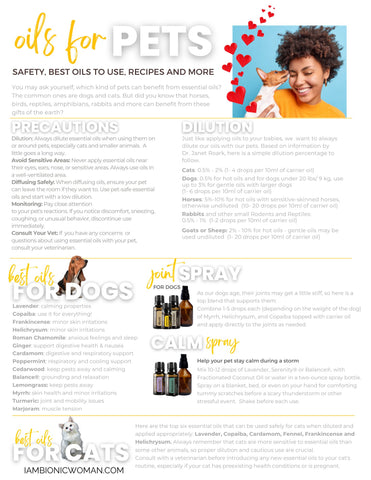
Pets and Essential Oils
Share
The theme this month is essential oils and pets. I will share precautions, the best oils to use and the ones to avoid. I personally follow the advice of Janet Roark, DVM when using oils with my pets and refer to her book Essential Oils and Pets Guidebook often.
Self selection method
I like using the self selection method where you allow your pet to smell the oil and watch their response. I rescued a puppy (who is now over 100 pounds!) from the shelter over a year ago and he can't stand the smell of any essential oil. I use his dislike of oils to my advantage. If there is something I don't want him to get into (like a plant in the yard or on furniture) I use oils to deter him and it works great!
This may seem overwhelming after looking at the list of precautions and oils to avoid. If you follow general guidelines such as allowing your pet to leave a room where essential oils are being used and observing their behavior - they will tell you!
Which kind of pets can benefit from essential oils?
The common ones are dogs and cats. But did you know that horses, birds, reptiles, amphibians, rabbits and more can benefit from these gifts of the earth?
✨Please consult your veterinarian if there are any questions or concerns.
Did you know animals have up to 50X more olfactory receptors? Humans have 6 million, and a dog has up to 300 million!
Use pure tested essential oils with pets
Remember there are different grades of essential oils. Most of the oils on the market are what we refer to as "fragrance oils." They contain additives and fillers that are not safe to be used with pets.
I use doTERRA because of its CPTG Certified Pure Tested Grade™ essential oils. This certification ensures rigorous testing for purity and potency, guaranteeing the safety of what you use for yourself and your beloved pets. You won't find any fillers, additives, or harmful ingredients in your products.
Here is a printable pdf⬇️
BUY ESSENTIAL OILS
PRECAUTIONS
- Dilution: Always dilute essential oils when using them on or around pets, especially cats and smaller animals. A little goes a long way.
- Avoid Sensitive Areas: Never apply essential oils near their eyes, ears, nose, or sensitive areas. Always use oils in a well-ventilated area.
- Diffusing Safely: When diffusing oils, ensure your pet can leave the room if they want to. Use pet-safe essential oils and start with a low dilution.
- Monitoring: Pay close attention to your pet's reactions. If you notice discomfort, sneezing, coughing, or unusual behavior, discontinue use immediately.
- Consult Your Vet: If you have any concerns or questions about using essential oils with your pet, consult your veterinarian. They can provide personalized advice based on your pet's specific needs.
INTERNAL USE
"Oils that indicate they are for internal use on the label may be given internally. It is generally not recommended that you give more than 1-2 drops internally at any one time”. [Source: Dr. Janet Roark]
- The best way is to add 1-2 drops of essential oils in a veggie capsule topped with a carrier oil and add it to their food.
- Cats: Be aware that with cats, we do not need to give any oil internally as they will take in the essential oils on their fur anyway during their grooming practices.
DILUTION
Based on information by Dr. Janet Roark, here is a simple dilution percentage to follow.
- Cats: 0.5% - 2% (1- 4 drops per 10ml of carrier oil)
- Rabbits and other small Rodents and Reptiles: 0.5% - 1% (1-2 drops per 10ml of carrier oil)
- Dogs: 0.5% for hot oils and for dogs under 20 lbs/ 9 kg, use up to 3% for gentle oils with larger dogs (1- 6 drops per 10ml of carrier oil)
- Goats or Sheep: 2% - 10% for hot oils - gentle oils may be used undiluted (1- 20 drops per 10ml of carrier oil)
- Horses: 5%-10% for hot oils with sensitive-skinned horses, otherwise undiluted (10- 20 drops per 10ml of carrier oil)
KITTENS AND PUPPIES
- Lavender is a go-to for soothing your young pets during stressful moments.
- Roman Chamomile can have a calming effect on your furry friends.
- Cardamom can help soothe their tummies.
- Frankincense: This versatile oil may support their well-being, especially during growth.
OILS TO AVOID WITH DOGS
- Melaleuca (Tea Tree) Oil: While Tea Tree oil is a powerful oil with numerous benefits, it can be toxic to dogs if ingested or applied undiluted to their skin. It's best to avoid using it around dogs.
- Birch Oil: Birch oil contains methyl salicylate, which can harm dogs, especially if ingested. Avoid using it near dogs.
- Wintergreen Oil: Wintergreen oil also contains methyl salicylate and should be avoided with dogs due to its potential toxicity.
- Cinnamon Bark Oil: Cinnamon bark oil is potent and can cause skin irritation and digestive upset in dogs. It's safer to keep this oil away from them.
- Oregano Oil: Oregano oil is potent and can lead to digestive issues in dogs. Use it cautiously and in diluted forms if necessary.
- Thyme Oil: Thyme oil is intense and may cause digestive discomfort in dogs. Use it sparingly and with dilution.
- Clove Oil: Clove oil is highly concentrated and can irritate a dog's skin, mouth, and digestive system. Avoid using it.
- Eucalyptus Oil: While eucalyptus oil can be used for respiratory support in dogs, it should be diluted and used in moderation. Ensure proper ventilation when diffusing.
- Citrus Oils: Citrus oils, like Lemon, Lime, and Wild Orange, can irritate dogs and should be used cautiously. Some dogs may dislike the scent.
- Ylang Ylang Oil: Ylang Ylang oil can cause excessive sedation in dogs. Use it very sparingly and ensure good ventilation.
- Arborvitae Oil: Arborvitae oil may cause skin irritation in dogs if applied topically. Avoid direct contact.
OILS TO AVOID WITH CATS
- Melaleuca (Tea Tree) Oil: Tea Tree oil is known for its potent properties but can be toxic to cats if ingested or applied undiluted on their skin. It's best to avoid using it around cats.
- Birch Oil: Birch oil contains methyl salicylate, which can harm cats, especially if ingested. It's advisable to avoid this oil when you have feline companions.
- Wintergreen Oil: Wintergreen oil also contains methyl salicylate and should be avoided with cats due to its potential toxicity.
- Peppermint Oil: While some cats may not react badly to Peppermint oil, it can cause respiratory issues in others. It's best to use Peppermint oil cautiously and in diluted forms around cats, if at all.
- Spearmint Oil: Like Peppermint, spearmint oil can be a respiratory irritant for cats. Avoid diffusing it extensively or applying it topically.
- Cassia Oil: Cassia oil is closely related to cinnamon and contains similar compounds that can be harsh on cats' sensitive systems. It's safer to keep this oil away from them.
- Cinnamon Bark Oil: Cinnamon bark oil is potent and can cause skin irritation and digestive upset in cats. It's best not to use it around them.
- Oregano Oil: Oregano oil is potent and can cause gastrointestinal upset in cats. It's safer to avoid using this oil where your cat can come into contact with it.
- On Guard® Blend: While On Guard® is a popular choice for immune support, it contains oils like cinnamon and clove that can be problematic for cats. Be cautious when diffusing this blend.
- Arborvitae Oil: This oil may cause skin irritation in cats. It's best to avoid topical application or direct contact.
- Eucalyptus Oil: Eucalyptus oil can be harmful to cats if ingested or if they inhale it in large quantities. It's best used sparingly and in well-ventilated areas.
- Citrus Oils: Many citrus oils, like Lemon, Lime, and Wild Orange, can irritate cats. Cats are often averse to the scent, so it's rarely an issue, but it's wise to be cautious.
USES AND RECIPES FOR PETS
🌿Massage: Use circular motions after applying an oil to your hands
🌿Ear Tipping: Apply diluted essential oil to the tips of your pet’s ears
🌿Reflexology points: Between the paw pads on the back paws
🌿Direct application: Pet along their back
🌿Joint Support: Combine 1-5 drops each (depending on the weight of the dog) of Myrrh, Helichrysum, and Copaiba topped with carrier oil and apply directly to the joints as needed.
🌿Calming Spray: Mix 10-12 drops of Lavender, doTERRA Serenity® or doTERRA Balance, with Fractionated Coconut Oil or water in a two-ounce spray bottle. Spray on a blanket, bed, or even on your hand for comforting tummy scratches before a scary thunderstorm or other stressful event. Shake before each use.
🌿Outside Pest Spray: Mix 10–12 drops of Cedarwood with Fractionated Coconut Oil or water in a two-ounce spray bottle. Spritz a little on your hand and then pet your dog before heading out — focus on the neck, belly and legs. Shake before each use.
🌿Hot Spot Spray: Add ingredients to a 1 oz. spray bottle and top off with aloe vera juice. Shake and spray as needed 2-4 times a day. This recipe also makes a great soothing skin spray for humans, especially on bug bites.
- 10 drops lavender
- 10 drops frankincense
- 10 drops myrrh
- 10 drops copaiba
- 2 tsp colloidal silver

